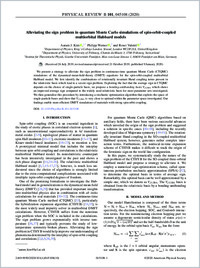Alleviating the sign problem in quantum Monte Carlo simulations of spin-orbit-coupled multiorbital Hubbard models
- Kim, Aaram J. Department of Physics, King’s College London, United Kingdom
- Werner, Philipp Department of Physics, University of Fribourg, Switzerland
- Valentí, Roser Institut für Theoretische Physik, Goethe-Universität Frankfurt, Frankfurt am Main, Germany
-
09.01.2020
Published in:
- Physical Review B. - 2020, vol. 101, no. 4, p. 045108
English
We present a strategy to alleviate the sign problem in continuous-time quantum Monte Carlo (CTQMC) simulations of the dynamical-mean-field-theory (DMFT) equations for the spin-orbit-coupled multiorbital Hubbard model. We first identify the combinations of rotationally invariant Hund coupling terms present in the relativistic basis which lead to a severe sign problem. Exploiting the fact that the average sign in CTQMC depends on the choice of single-particle basis, we propose a bonding-antibonding basis Vj3/2BA which shows an improved average sign compared to the widely used relativistic basis for most parameter sets investigated. We then generalize this procedure by introducing a stochastic optimization algorithm that exploits the space of single-particle bases and show that Vj3/2BA is very close to optimal within the parameter space investigated. Our findings enable more efficient DMFT simulations of materials with strong spin-orbit coupling.
- Faculty
- Faculté des sciences et de médecine
- Department
- Département de Physique
- Language
-
- English
- Classification
- Physics
- License
-
License undefined
- Identifiers
-
- RERO DOC 328234
- DOI 10.1103/PhysRevB.101.045108
- Persistent URL
- https://folia.unifr.ch/unifr/documents/308365
Statistics
Document views: 104
File downloads:
- pdf: 268
